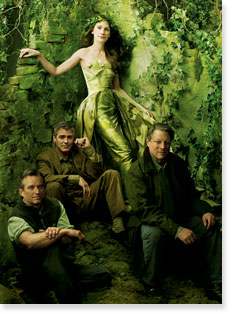April 24, 2006
Hollywood glamour, activist passion, false rhetoric
 The May issue of Vanity Fair is the magazine's "first 'Green Issue'". The press release explains that "[t]he May cover features a quartet of eco–power players, capturing Hollywood glamour and activist passion: Robert F. Kennedy Jr., Al Gore, Julia Roberts, and George Clooney, photographed by Annie Leibovitz." The issue features an article by Gore, "The Moment of Truth", which starts like this:
The May issue of Vanity Fair is the magazine's "first 'Green Issue'". The press release explains that "[t]he May cover features a quartet of eco–power players, capturing Hollywood glamour and activist passion: Robert F. Kennedy Jr., Al Gore, Julia Roberts, and George Clooney, photographed by Annie Leibovitz." The issue features an article by Gore, "The Moment of Truth", which starts like this:
Clichés are, by definition, over used. But here is a rare exception - a certifiable cliché that warrants more exposure, because it carries meaning deeply relevant to the biggest challenge our civilization has ever confronted.
The Chinese expression for "crisis" consists of two characters: 危機. The first is a symbol for "danger"; the second is a symbol for "opportunity."
Senator Gore is right about the cliché part: millions of business pep talks have used this rhetorically-convenient deconstruction of wēi+jī as danger+opportunity. Unfortunately, they're all wrong about the linguistic facts.
As Victor Mair put it, in an essay on pinyin.info more than a year ago,
While it is true that wēijī does indeed mean "crisis" and that the wēi syllable of wēijī does convey the notion of "danger," the jī syllable of wēijī most definitely does not signify "opportunity." ... The jī of wēijī, in fact, means something like "incipient moment; crucial point (when something begins or changes)." Thus, a wēijī is indeed a genuine crisis, a dangerous moment, a time when things start to go awry.
Victor goes on to explain that
Aside from the notion of "incipient moment" or "crucial point" discussed above, the graph for jī by itself indicates "quick-witted(ness); resourceful(ness)" and "machine; device." In combination with other graphs, however, jī can acquire hundreds of secondary meanings. It is absolutely crucial to observe that jī possesses these secondary meanings only in the multisyllabic terms into which it enters. To be specific in the matter under investigation, jī added to huì ("occasion") creates the Mandarin word for "opportunity" (jīhuì), but by itself jī does not mean "opportunity."
Thus wēijī is roughly "incipient moment of danger", while jīhuì is roughly "occasion of incipient moment". These decompositions should not be taken too literally, since such compound words acquire their own particular meanings over time. Looking at additional combinatoric possibilities of jī underlines this point. For us English speakers, it might help to consider the role of the core meaning of script in the modern English words inscription, description, prescription, transcription, ascription, conscription. Prescription can mean "medicine", and has script as a slang reduction. But this hardly licenses us to analyze con+scription as with+medicine , and to use this as a rhetorical device to introduce the idea that reviving the military draft would be a healthy thing for the American body politic.
Anthropogenic climate change is clearly a serious "incipient moment of danger". It's unfortunate that Senator Gore's essay "The Moment of Truth" undermines its own credibility by opening with a moment of false linguistic analysis. The false deconstruction of wēijī was debunked here just about a year ago, under the helpful title "Crisis ≠ Danger + Opportunity". Avoid rhetorical embarrassment, politicians: have your staffers read Language Log.
[Update: several readers have written to point out that most Chinese dictionaries include "opportunity" among the glosses they give for jī (traditional character 機, simplified character 机) . Indeed CEDICT, which I linked to in the body of the article, gives the glosses "machine; opportunity; secret". Victor Mair's point, which I've quoted above, is that
Aside from the notion of "incipient moment" or "crucial point" discussed above, the graph for jī by itself indicates "quick-witted(ness); resourceful(ness)" and "machine; device." In combination with other graphs, however, jī can acquire hundreds of secondary meanings. It is absolutely crucial to observe that jī possesses these secondary meanings only in the multisyllabic terms into which it enters.
and that "opportunity" enters lists of glosses for jī only because of the influence of multisyllabic terms such as 机会 jī huì. I'm taking Victor's word for this, seconded by Mark Swofford at pinyin.info.
I guess the question could be put another way: does the notion of "opportunity" enter into the meaning of the compound word wēi jī, either historically or psycholinguistically? Victor believes that the answer is "no". I have no independent basis for making a judgment, but I welcome opinions from scholars and native speakers.]
Posted by Mark Liberman at April 24, 2006 06:02 AM